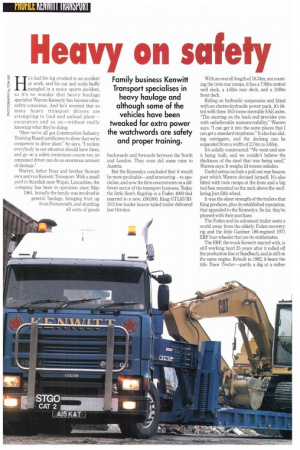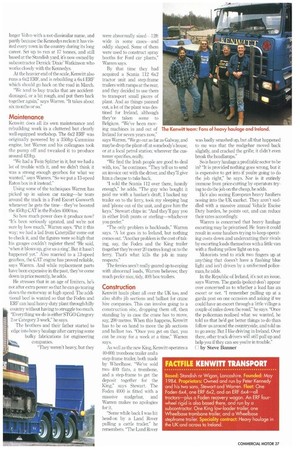Heavy on safety
Page 38

Page 39

If you've noticed an error in this article please click here to report it so we can fix it.
He's had his leg crushed in an accident at work, and his ear and scalp badly mangled in a motor sports accident, so it's no wonder that heavy haulage specialist Warren Kennedy has become ultrasafety-conscious. And he's worried that so many heavy transport drivers are attempting to load and unload plant— excavators and so on—without really knowing what they're doing.
"Here we've all got Construction Industry Training Board certificates to show that we're competent to drive plant," he says. "I reckon everybody in our situation should have them, and go on a safety-awareness course too; an untrained driver can do an enormous amount of damage."
Warren, father Peter and brother Stewart own and run Kenwitt Transport. With a small yard in Standish near Wigan, Lancashire, the company has been in operation since May 1984. Initially the family was involved in general haulage, bringing fruit up from Portsmouth, and shuttling all sorts of goods backwards and forwards between the North and London. They even did some runs to Austria.
But the Kennedys concluded that it would be more profitable—and interesting—to specialise, and now the firm concentrates on a different sector of the transport business, Today the little fleet's flagship is a Foden 4000 6x4 married to a new, £60,000, King GTL83/3H19.5 low-loader beaver-tailed trailer delivered last October. With an overall length of 16.34m, not counting the twin rear ramps, it has a 7.92m central well deck, a 4.62m rear deck, and a 2.69m front deck.
Riding on hydraulic suspension and fitted with an electro-hydraulic power pack, it's fitted with three 16.5-tonne steerable SAE axles. "The steering on the back end provides you with unbelievable manoeuvrability," Warren says. "I can get it into the same places that I can get a standard stepframe." It also has sliding outriggers, and the decking can be expanded from a width of 2.74m to 3.65m.
It's solidly constructed: "We went and saw it being built, and we couldn't believe the thickness of the steel that was being used," Warren says. It weighs 24 tonnes unladen.
Useful extras include a pull-out rear beacon post which Warren devised himself. It's also fitted with twin ramps at the front and a big tool box mounted on the neck above the oscillating Jost fifth wheel.
It was the sheer strength of the trailers that King produces, plus its established reputation, that appealed to the Kennedys. So far, they're pleased with their purchase.
The Foden and its advanced trailer seem a world away from the elderly Foden recovery rig and the little Gardner 180-engined 1971 ERF four-wheeler that are its stablemates.
The ERF, the truck Kenwitt started with, is still working hard 25 years after it rolled off the production line at Sandbach, and is still on the same engine. Rebuilt in 1982, it bears the title Town Trolter—partly a dig at a rather larger Volvo with a not-dissimilar name, and partly because the Kennedys reckon it has visited every town in the country during its long career. Set up to run at 17 tonnes, and still based at the Standish yard, it's now owned by subcontractor Derrick 'Dixie' Watkinson who works closely with the Kennedy&
At the heavier end of the scale, Kenwitt also runs a 6x2 ERF, and is rebuilding a 6x4 ERF which should go back on the road in March.
"We tend to buy trucks that are accidentdamaged, or a bit rough, and put them back together again," says Warren. "It takes about six months or so."
Maintenance
Kenwitt does all its own maintenance and rebuilding work in a cluttered but clearly well-equipped workshop. The 6x2 ERF was originally powered by a 350hp Cummins engine, but Warren and his colleagues took the pump off and tweaked it to produce around 420hp.
"We had a Twin Splitter in it, but we had a lot of trouble with it, and we didn't think it was a strong enough gearbox for what we wanted," says Warren. "So we put a 13-speed Eaton box in it instead."
Using some of the techniques Warren has picked up in saloon car racing—he tears around the track in a Ford Escort Cosworth whenever he gets the time they've boosted the 450hp CAT in the Foden 4000 too.
So how much power does it produce now? "It's been seriously uprated, and we're not sure by how much," Warren says. "Put it this way; we had a lad from Caterpillar come out to check it, and the figures were so high that his gauges couldn't register them! "He said, 'when it blows up, give us a ring'. But it hasn't happened yet." Also married to a 13-speed gearbox, the CAT engine has proved reliable, says Warren. And while replacement parts have been expensive in the past, they've come down in price recently, he adds.
He stresses that in an age of limiters, he's not after extra power so that he can go tearing down the motorway at high speed. The additional beef is wanted so that the Foden and ERF can haul heavy-duty plant through hilly country without having to struggle too much. "Everything we do is either STGO Category 2 or Category 3 work," he says.
The brothers and their father started to edge into heavy haulage after carrying some bulky fabrications for engineering Nok companies.
"They weren't heavy, but they were abnormally sized-12ft wide in some cases—and oddly shaped. Some of them were used to construct spray booths for Ford car plants," Warren says.
By that time they had acquired a Scania 112 6x2 tractor unit and step-frame trailers with ramps at the rear, and they decided to use them to transport small pieces of plant. And as things panned out, a lot of the plant was destined for Ireland, although they've taken some to Belgium. "We've been moving machines in and out of Ireland for seven years now," says Warren. "We go out as far as Galway, and maybe drop the plant off at somebody's house, or at a local petrol station; wherever the customer specifies, really.
"We find the Irish people are good to deal with, too," he continues. "They tell us to send an invoice out with the driver, and they'll give him a cheque to take back.
"I sold the Scania 112 over there, funnily enough," he adds. "The guy who bought it paid me with a banker's draft, 1 backed my trailer on to the ferry, took my sleeping bag and 'phone out of the unit, and gave him the keys." Stewart chips in: "And they'll pay you in either Irish punts or sterling—whichever you prefer."
"The only problem is backloads," Warren says. "A lot goes in to Ireland, but nothing comes out. "Another problem is the cost of taking, say, the Foden and the King trailer (together they're over 20 metres long) on to the ferry. That's what kills the job in many respects."
The ferries aren't really geared up to coping with abnormal loads, Warren believes; they much prefer nice, tidy, 40ft box trailers.
Construction
Kenwitt hauls plant all over the UK too, and also shifts jib sections and ballast for crane hire companies. This can involve going to a construction site, dropping them off, then standing by in case the crane has to move, say, 200 metres. When this happens, Kenwitt has to be on hand to move the jib sections and ballast too. "Once you get on that, you can be away for a week at a time," Warren says.
As well as the new King, Kenwitt operates a 40-60ft trombone trailer and a step-frame trailer, both made by Wheelbase. "We've sold two 40ft flats, a trombone, and a step-frame to get the deposit together for the King," says Stewart. The Foden 4000 is fitted with a massive nudgebar, and Warren makes no apologies for it.
"Some while back I was hit head-on by a Land Rover pulling a cattle trailer," he remembers. "The Land Rover was badly smashed up, but all that happened to me was that the nudgebar moved back slightly, and cracked the grille; it didn't even break the headlamps."
So is heavy haulage a profitable sector to be in? "It is provided nothing goes wrong, but it is expensive to get into if you're going to do the job right," he says. Nor is it entirely immune from price-cutting by operators trying to do the job on the cheap, he adds.
IIe's also seeing European heavy hauliers nosing into the UK market. They aren't saddled with a massive annual Vehicle Excise Duty burden, he points out, and can reduce their rates accordingly.
Warren is concerned that heavy haulage escorting may be privatised. He fears it could result in some hauliers trying to keep operating costs down and undercutting their rivals by escorting loads themselves with a little van with a flashing yellow light on top.
Motorists tend to stick two fingers up at anything that doesn't have a flashing blue light and isn't driven by a uniformed policeman, he adds.
In the Republic of Ireland, it's not an issue, says Warren. The garda (police) don't appear over concerned as to whether a load has an escort or not. "I remember pulling up at a garda post on one occasion and asking if we could have an escort through a little village a couple of miles down the road," he says. "Once the policeman realised what we wanted, he told us that he'd got better things to do than follow us around the countryside, and told us to go away. But I like driving in Ireland. Over there, other truck drivers will still pull up and help you if they can see you're in trouble." ri by Steve Banner
































































































